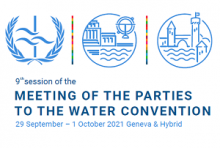



INBO Webinar at the 9th session of the Meeting of the Parties to the 1992 Water Convention
Accelerating the development of bankable projects for climate change adaptation in transboundary basins
Tuesday 28th of September 2021, 4:00 p.m. to 5:30 p.m. (CEST / Paris time)
with simultaneous interpretation (French - English - Spanish), on Zoom
Greater frequency and intensity of floods & droughts, unpredictable rainfall patterns, altered river flows, degradation of aquatic ecosystems, sea level rise-induced salinization of coastal groundwater… Water is the first victim of climate change, and our societies are collateral victims.
A massive financial effort is required to improve the management of water resources at the scale where the benefits reaped from (green and grey) water infrastructures development and climate change adaptation planning are the greatest: the scale of hydrographic basins. Transboundary basins in particular should be targeted by that effort: around 40 per cent of the world’s population depend on waters shared by two or more countries and over 90 percent of the world’s population lives within countries that share transboundary basins.
Yet, in the portfolio of projects supported by climate finance actors, water in general is not well represented, lagging far behind the sectors of energy, agriculture or forestry. Part of the problem still is a lack of awareness from donors that adaptation of these sectors (cooling power plants, irrigating crops, limiting deforestation and desertification) requires water. And maintaining a strong communication and advocacy effort is part of the solution.
But the heart of the problem seem to lie both in the complexity of the climate finance landscape and in the limited capacities of water actors and transboundary basin organizations to achieve a cycle of climate project preparation and to access donors’ preparation facilities. There is a necessity to build the capacities of these actors to prepare well-designed, bankable climate resilient water projects that will attract funding from the wide range of private and public donors of climate finance.
This webinar will geographically focus on (but not be limited to) Africa and aims to present how can countries, basin organizations and donors accelerate the incubation, financing and implementation of projects of adaptation to climate change in transboundary basins.
Opening
- Dr. Eric Tardieu, Secretary General, International Network of Basin Organizations (INBO)
Intervention of great witnesses
1. Mr. Blaise Léandre Tondo, Principal expert, International Commission of the Congo-Ubangui-Sangha basin (CICOS)
The experience of CICOS (presentation in French)
2. Mr. Abdelkader Dodo, Water Department Coordinator, Sahara & Sahel Observatory (OSS)
Strengthening the resilience of climate-vulnerable communities in the Senegal River Basin using a multi-risk early warning system and improving adaptive capacity (presentation in French)
3. Mr. Dragan Zeljko, Secretary, International Sava River Basin Commission (ISRBC)
Experiences of the Sava Commission
4. Mr. Frédéric Maurel, Deputy director of the Water and Sanitation Department, French Development Agency (AFD)
Financing adaptation to climate change in transboundary basins (presentation in French)
Questions & answers with the participants
Conclusion
- Mr. Erwin De Nys, Program Manager “Cooperation in International Waters in Africa” World Bank
